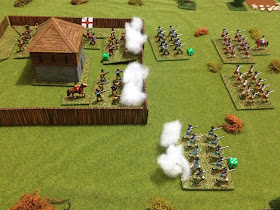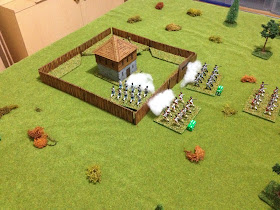Order of Battle:
British
3 (1) Militia units
1 Artillery unit with fort
Army resolve = 4
French
6 (2) Regular units
Commander Drucour (A0D1)
Army resolve = 7
At first glance is appears to be the French have a certain victory. They are double the number of infantry and of better quality being regulars. They also have a solid army resolve of 7 (1 for each unit plus 1 for their commander's D1 quality).
So how did the game go...
 |
| The French move forward as quickly as possible. No subtlety here, it is a straight forward storm Fort Oswego walls. |
 |
| A couple of French units (including Grenadiers) are moving faster than the other lines which are trying to catch up. The delay provides the fort gun with more opportunities to target the reach line. |
 |
| The first line of French begin the assault, while commander Drucour is having difficulties coordinating the second line. |
 |
| The attack is in full swing with casualties mounting as the second French line arrives. |
 |
| The first French unit is eliminated and the Grenadiers are suffering badly. |
 |
| The militia within the fort are conducting themselves well. They counterattack to repulse and eliminate the grenadier unit. |
 |
| Units from the French second line fill the gaps left by eliminated units. |
 |
| The battle rages fiercely as the militia give good account of themselves and the French press forward their assault. |
 |
| Everything seems lost as two militia units are lost and the French make it across the walls. |
 |
| As more French units get inside the fort the remaining militia unit gallantly fights on (due to some low rolling against their army resolve). |
I didn't get a photo of the last turns, but the militia eliminate another ranch unit and it was down to a roll on the French army resolve. A 3 scored on a D3 dice and French army resolve fails. A 2 is rolled, the French hold their nerve, and in the next and final turn the last militia unit succumbs.
When I setup this game I thought easy French win. But, it turned out to be a close run thing. Both sides lose a regiment. The British lose a regiment of militia and French a regiment of regulars. Success to the French, but at a price was paid.

Sheesh! What a nail biter of a battle! So, French Army Resolve was teetering at a ‘1’ when the militia was eliminated? Is that correct? If so, very close battle. The militia fought like lions. The loss of a regiment of French Regulars is going to hurt much more than the loss of a British militia regiment. If Loudoun can keep from losing his force to attrition, he might have the strength to retake the fort before it can be reinforced. Very interesting situation!
ReplyDeleteIt was close, both sides were on the brink of failure. The British had rolled well against their army resolve with a 1, 2 and 1 for the three lost units. So they were on 4 and had not exceeded their army resolve of 4. A surprisingly enjoyable game.
DeleteHaving found yourself ten games deep into this campaign, is the multi-level aspect of our collaboration providing you the added interest and purpose you sought for fighting out battles on your table?
DeleteThis campaign is proving interesting in a number of ways. Firstly, I am playing out games in the context of a campaign without necessarily knowing how the rules of the campaign work. So the context and narrative come to the fore. Secondly, there are campaign regions which are hotly contested. I certainly did not think I would be playing four Fort William Henry games each with its own significance for loss of units or to last out the winter months.
DeleteHow are things from your operational perspective?
This has been good fun for me as well! I have really enjoyed making the operational maneuvers and awaiting the battle results.
DeleteThe constrictions in the avenues of approach into the other's "backfield" have really become evident. Also the necessity to leap from supply source to supply source is crucial. Fort William-Henry has shown just how important this location was. Having fought over it four times now, the campaign may have moved on to Carillon as a focal. If Isle aux Noix falls to the British then the pathway to the heart of New France may open.
Your battles have produced a few surprising results which throws uncertainty into the campaign keeping the tension high. The Battle at Fort Carillon was an important one. Time to see if the British can capitalize on the victory or if the French can recover.
I have learned much about the boardgame Montcalm & Wolfe too. With this experience, I have a much better understanding of its strengths and weaknesses. A very good gaming experience all around!
Thank you.
well, I eat my words from a post that I left on Jonathan's blog ..."A safe action for the French I would have thought" :-)
ReplyDeleteThat was my impression too, but it turned out to be quite a battle with losses on both sides.
DeletePeter- a nice report of the action about Fort Oswego- the French may have been defeated if the British had another Malita unit- perhaps in the fort or woods...as you say it was "a close run thing". Nice pictures. Cheers> KEV.
ReplyDeleteAn extra unit outside the fort to harass attackers could have been useful.
Delete